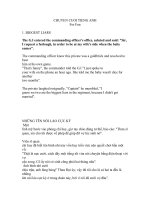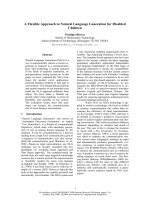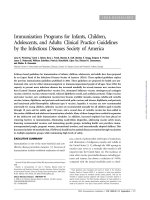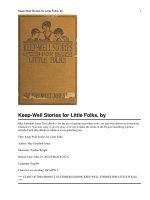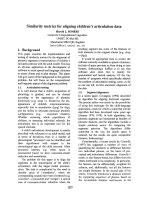stories for thinking children 1
Bạn đang xem bản rút gọn của tài liệu. Xem và tải ngay bản đầy đủ của tài liệu tại đây (4.72 MB, 122 trang )
ABOUT THE AUTHOR
The author, who writes under the pen-name
Harun Yahya, was born in Ankara in 1956. He
studied arts at Istanbul's Mimar Sinan University,
and philosophy at Istanbul University. Since the
1980s, the author has published many books on
political, faith-related and scientific issues.
Greatly appreciated all around the world, these
works have been instrumental in helping many
to return their faith in Allah, and, in many
others, to gain a deeper insight into their faith. Harun Yahya's books
appeal to all kinds of readers, regardless of their age, race, or
nationality, for they focus on one objective: to broaden the reader's
perspective by encouraging him or her to think about a number of
critical issues, such as the existence of Allah and His unity, and to live
by the values He prescribed for them.
CC
hildren! In this book of stories that has been specially written
just for you are a lot of important facts. You will find many
examples of the marvels in the living things created by Allah, and
will once again see the unique nature of our Lord’s power. You will
also remember to respond to every event created by Allah with
patience and submission and to give thanks to our Lord at every
moment.
You will learn why it is very important to behave well to people
around you, that cleanliness is a feature of a believer, and that
pleasant words are a virtue that is pleasing to Allah.
These are the names of some of the stories in this book:
Anwar and the Tortoise, What Rasheed’s Brother Taught Him,
Omar and the Penguin, Jamal and the Parrot, There’s Good in
Everything, It’s Important to Follow the Good Word, The
Cleanliness of Believers, Naeem and the Pretty Peacock, Anwar and
the Little Bird, Maqsud and the Kitten, Sayid and the Squid, Kareem
and Grandpa Hassan.
in 1956. Having completed his primary and secondary education in Ankara, he
studied arts at Istanbul's Mimar Sinan University and philosophy at Istanbul
University. Since the 1980s, he has published many books on political, scientific,
and faith-related issues. Harun Yahya is well-known as the author of important
works disclosing the imposture of evolutionists, their invalid claims, and the
dark liaisons between Darwinism and such bloody ideologies as fascism and
communism.
His pen-name is a composite of the names Harun (Aaron) and Yahya (John), in
memory of the two esteemed Prophets who fought against their people's lack of
faith. The Prophet's seal on the his books' covers is symbolic and is linked to the
their contents. It represents the Qur'an (the final scripture) and the Prophet
Muhammad (peace be upon him), last of the prophets. Under the guidance of the
Qur'an and the Sunnah (teachings of the Prophet), the author makes it his pur-
pose to disprove each fundamental tenet of godless ideologies and to have the
"last word," so as to completely silence the objections raised against religion. He
uses the seal of the final Prophet, who attained ultimate wisdom and moral per-
fection, as a sign of his intention to offer the last word.
All of Harun Yahya's works share one single goal: to convey the Qur' an's mes-
sage, encourage readers to consider basic faith-related issues such as Allah's
Existence and Unity and the hereafter; and to expose godless systems' feeble
foundations and perverted ideologies.
Harun Yahya enjoys a wide readership in many countries, from India to
America, England to Indonesia, Poland to Bosnia, and Spain to Brazil. Some of
his books are available in English, French, German, Spanish, Italian, Portuguese,
Urdu, Arabic, Albanian, Russian, Serbo-Croat (Bosnian), Polish, Malay, Uygur
Turkish, and Indonesian.
Greatly appreciated all around the world, these works have been instrumen-
tal in many people recovering faith in Allah and gaining deeper insights into
their faith. His books' wisdom and sincerity, together with a distinct style that's
easy to understand, directly affect anyone who reads them. Those who seriously
consider these books, can no longer advocate atheism or any other perverted ide-
ology or materialistic philosophy, since these books are characterized by rapid ef-
fectiveness, definite results, and irrefutability. Even if they continue to do so, it
will be only a sentimental insistence, since these books refute such ideologies
from their very foundations. All contemporary movements of denial are now ide-
ologically defeated, thanks to the books written by Harun Yahya.
This is no doubt a result of the Qur'an's wisdom and lucidity. The author mod-
estly intends to serve as a means in humanity's search for Allah's right path. No
material gain is sought in the publication of these works.
Those who encourage others to read these books, to open their minds and
hearts and guide them to become more devoted servants of Allah, render an in-
valuable service.
Meanwhile, it would only be a waste of time and energy to propagate other
books that create confusion in people's minds, lead them into ideological chaos,
and that clearly have no strong and precise effects in removing the doubts in
people's hearts, as also verified from previous experience. It is impossible for
books devised to emphasize the author's literary power rather than the noble
goal of saving people from loss of faith, to have such a great effect. Those who
doubt this can readily see that the sole aim of Harun Yahya's books is to overcome
disbelief and to disseminate the Qur'an's moral values. The success and impact
of this service are manifested in the readers' conviction.
One point should be kept in mind: The main reason for the continuing cruelty,
conflict, and other ordeals endured by the vast majority of people is the ideolog-
ical prevalence of disbelief. This can be ended only with the ideological defeat of
disbelief and by conveying the wonders of creation and Qur'anic morality so that
people can live by it. Considering the state of the world today, leading into a
downward spiral of violence, corruption and conflict, clearly this service must be
provided speedily and effectively, or it may be too late.
In this effort, the books of Harun Yahya assume a leading role. By the will of
Allah, these books will be a means through which people in the twentyfirst cen-
tury will attain the peace, justice, and happiness promised in the Qur'an.
www.harunyahya.com
•
A special chapter is assigned to the collapse of the theory of evolution
because this theory constitutes the basis of all anti-spiritual philosophies.
Since Darwinism rejects the fact of creation—and therefore, Allah's Exis-
tence—over the last 140 years it has caused many people to abandon
their faith or fall into doubt. It is therefore an imperative service, a very
important duty to show everyone that this theory is a deception. Since
some readers may find the chance to read only one of our book, we think
it appropriate to devote a chapter to summarize this subject.
• All the author's books explain faith-related issues in light of Qur'anic
verses, and invite readers to learn Allah's words and to live by them. All
the subjects concerning Allah's verses are explained so as to leave no
doubt or room for questions in the reader's mind. The books' sincere,
plain, and fluent style ensure that everyone of every age and from every
social group can easily understand them. Thanks to their effective, lucid
narrative, they can be read at a one sitting. Even those who rigorously re-
ject spirituality are influenced by the facts these books document and
cannot refute the truthfulness of their contents.
• This and all the other books by the author can be read individually, or
discussed in a group. Readers eager to profit from the books will find
discussion very useful, letting them relate their reflections and experi-
ences to one another.
• In addition, it will be a great service to Islam to contribute to the pub-
lication and reading of these books, written solely for the pleasure of
Allah. The author's books are all extremely convincing. For this reason,
to communicate true religion to others, one of the most effective methods
is encouraging them to read these books.
• We hope the reader will look through the reviews of his other books at
the back of this book. His rich source material on faith-related issues is
very useful, and a pleasure to read.
• In these books, unlike some other books, you will not find the author's
personal views, explanations based on dubious sources, styles that are
unobservant of the respect and reverence due to sacred subjects, nor
hopeless, pessimistic arguments that create doubts in the mind and de-
viations in the heart.
Say Your Prayers Before
Prayers Are Said For You
Khatoons Inc.
Publishers and Distributors of Islamic Books
6650 Autumn Wind Circle
Clarksville, Maryland 21029 USA
Phone: (410) 531-9653
1 800 667-7884
e-mail:
Printed by: SECIL OFSET - December 2003
100 Yil Mahallesi MAS-SIT Matbaacilar Sitesi
4. Cadde No: 77 Bagcilar-Istanbul
Tél: +90 212 629 06 15
Amar and the Tortoise 8
Hussein and the Elephant 12
What Rasheed's Brother Taught Him 14
Omar and the Penguin 18
Jamal and the Parrot 20
There's Good in Everything 22
Ahmad and the Happy Duck 26
Cute Long-Tailed Squirrels 32
It's Important to Follow the Good Word 38
The Cleanliness of Believers 42
Naeem and the Pretty Peacock 46
Anwar and the Little Bird 48
Ali's Little Friend 54
Maqsud and the Kitten 60
Sayid and the Squid 64
Kamal and the Seahorse 68
Kareem and Grandpa Hassan 70
Grandpa Uthman and his Grandson 84
Our Class 86
Appendix: The Deception of Evolution 92
88
OO
ne day, Amar was reading one of his favorite stories, "The Hare
and the Tortoise." He laughed at what happened to the hare and
learned from the tortoise how important it is to use one's head and that
cleverness is more than a match for physical superiority. While he was
thinking about these things, he suddenly realized that the tortoise in the
book had come alive on the page and had started talking to him:
The tortoise began by saying: "Hi Amar! It's great that you are so
young and clever enough to learn a lesson from the story about the hare
and me."
Amar asked "How old are you?"
The tortoise replied: "I'm not as young as I look; I am actually 45 years
old. Tortoises live for about 60 years; and there's even one kind of tor-
toise called the 'Testudo' that can live as long as 189 years."
"What's your favorite season?" asked Amar.
The tortoise replied: "Warm weather is very important for our survival.
Our body temperature changes with the temperature of the air around
us and is usually between 32.2 and 32.4 Fahrenheit (0.1 and 0.2 de-
grees Celcius) lower than that of the air. Our digestive system speeds up
as the temperature becomes hotter. When Allah created us, He
99
gave us this characteristic to make it easier for us to survive when it is
very hot. We need all the gifts that Allah gives us, but He is Rich Beyond
Need."
Amar then wondered: "What's your favorite food?"
"We love yellow squash. Our eyes are very sharp, and they see yel-
lows best. That means we can easily find our favorite food," re-
sponded the tortoise.
Amar had another question for the tortoise:
"Do you hibernate in winter?"
The tortoise explained: "Yes. When the
weather gets colder, from October on, and
food becomes harder to find, our bodies slow
down and we protect ourselves by going to
sleep for several months. Our heartbeat and our
breathing slow down. We hibernate between
October and March. Because Allah created us in this
way, we don't have to stay awake in winter with noth-
ing to eat, which would be fatal to us.
Allah has protected
EEvveerryytthhiinngg iinn tthhee hheeaavveennss
aanndd eevveerryytthhii nn gg ii nn tthhee
EEaarrtthh bbeelloonn gg ss tt oo HHiimm
AAllllaahh ii ss tthhee RRii cc hh BBeeyyoonndd
NNeeeedd,, tthhee PPrraaiisseeww oo rr tt hh yy
((SSuurraatt aall HHaajjjj:: 66 44))
us for generations by sending us to sleep at just the right time."
Amar had more to ask: "I know you live on dry land, but I also think
some of you live in the water. Can you tell me about them?"
The tortoise smiled: "You're right, Amar. There are tortoises, fresh
water turtles and sea turtles among us. I live on dry land, for example. I
prefer fields, soft soil and grapevines. Fresh water turtles, the kind you
keep in aquariums, like lakes and river banks. Sea turtles live in the warm
seas and come onto land to lay their eggs. Let me tell you something in-
teresting about the Caretta sea turtle:
Caretta carettas go to warm beaches to lay their eggs. Allah inspires
the young turtles that hatch from the eggs to head toward the light re-
flected off the sea, in other words, to go straight toward where they will
live. How do these baby turtles know that the sea is the best place for
them to live in? It must be because our Lord inspires that knowledge in
them."
Amar said: "You're right. Everyone with a mind to think with must
know that the world is full of Allah's wonders. We must always remem-
ber that you and I, all animals and trees and everything else are a sign
of Him. It was nice to talk to you. Thanks for telling me so much. Bye-
bye."
"Good-bye, you clever boy," said the tortoise.
1100
1111
Storks are large migra-
tory birds between 3-5 feet (1-
1.5 meters) tall with big, white wings.
Their red beaks and legs make them look
cute. Every year, storks migrate in large num-
bers because they can't live in cold regions.
Storks thus tell us that the hot days of summer are
coming, and it is a miracle they know when the
weather is about to warm up. The following year,
when spring has come round again, storks return
on their miles-long journey and find their old
nests. Of course it is Allah Who inspires
such a good memory and sense
of direction in them.
1122
HH
ussein's mother took him to the zoo one week-end. It was the first
time he had seen so many different animals in one place. They went
to the elephant house. A young elephant was tripping over his trunk and
falling down, and the baby's mother came to his help every time he did
so.
The mother elephant saw Hussein looking at them and ex-
plained: "You see, my baby is so young, he doesn't
know how to use his trunk yet. He will not leave
my side for 12 full years, and for the first six
months I will teach him to use his trunk
properly."
Hussein answered: "I have always
wondered what do elephants use their
trunks for? Do you breathe through them?"
The mother elephant told him: "It is our trunks that make us different
from all other animals. Our nostrils are at the end of our trunks, and we
use them to carry food and water to our mouths, pick things up and to
smell things with; we can hold up to 1 gallon (four liters) of water in them.
And did you know, we can pick even up a tiny pea with them? We did-
n't acquire our trunks by chance. They are a gift from the mercy of
Almighty Allah, Who created everything."
Hussein then enquired, "How do you manage to find
enough to eat?"
The mother elephant explained: "We are the
biggest animals on Earth. An elephant eats about 730
pounds (330 kilos) of plants every day. We have to
spend 16 hours a day eating."
Hussein thought of another question, "What
about your teeth?"
1133
The mother elephant answered: "As you can see, on either side of my
mouth I have two long, sharp teeth. We defend ourselves with these teeth
and also use them to dig holes to find water. Of course, our teeth wear
down a lot doing all this work, and for that reason, Almighty Allah has
given us a special ability. A new tooth grows from behind to replace the
old, worn out one. Because Allah created us in this way, we are able to
grow a new tooth and use it properly."
Hussein thought for a moment, "You must be hungry, your stomach is
rumbling."
The mother elephant smiled: "We make these sounds to communicate
with one another. We can talk to one another from as far away as 2.5
miles (4 km)."
Hussein was puzzled, "So, how do you talk to one another?"
The mother elephant said: "Allah created a special organ in our fore-
heads that makes sounds that human beings can't hear. So we speak in
a code that other animals can't understand and we can hear one another
across very long distances. As you can see, Allah's magnificent creation
can be seen very well in us elephants. Don't for-
get that we have to think about these things
and thank Allah all the time!"
Hussein nodded: "Thanks for telling me
all those things. Now I have to go back
to my mother."
"Good-bye Hussein,"
said the mother elephant.
On his way back to his
mother, Hussein won-
dered, "Who knows how
great Allah's miracles are
in other animals?"
1144
RR
asheed was walking to the bus stop one day to go home after
school. While he was waiting at there, he began listening to a
conversation a group of other children were having. One of them
was speaking with a loud voice, pointing to his shirt and an electric
car he was holding in his hand. Rasheed began to pay more atten-
tion, and was able to make out what they were saying.
The name of the boy speaking so loudly was Asim. He was telling
his friends about his expensive clothes and latest toys. When he ar-
rived home, Rasheed could not get what the boy said out of his
mind. When his brother, Zubair, saw that Rasheed was deep in
thought, he sat down beside him.
"What's going
on, Rasheed?
What are you
thinking about?"
he asked.
Rasheed an-
swered: "I saw a
boy on my way
home. He was talk-
ing to his friends
about his fine
clothes and nice
toys. He was being
really thoughtless; he didn't care that some of his friends could not
afford to buy such things. I thought his behavior was very wrong."
Zubair agreed: "You're right, Rasheed, what he did was not right at
all. Allah has given us all different blessings. The fact that a person
has more fine things, is more good-looking or successful, is not due
to his own ability at all. Allah has given us these things to test us and
to see how we will act if He gives us such blessings.
The behavior most pleasing to Allah is when a person doesn't for-
get that Allah has given him everything he has. We must not boast
about or be spoiled by the blessings Allah has given us; we must al-
ways behave modestly. Anyway, it's Satan who gets puffed up with
pride. If you remember, the verse we read yesterday was about this
matter. Allah tells us that: '
TThhaatt iiss ssoo tthhaatt yyoouu wwiillll nnoott bbee ggrriieevveedd
aabboouutt tthhee tthhiinnggss tthhaatt ppaassss yyoouu bbyy oorr eexxuulltt aabboouutt tthhee tthhiinnggss tthhaatt ccoommee
ttoo yyoouu AAllllaahh ddooeess nnoott lloovvee aannyy vvaaiinn oorr bbooaassttffuull mmaann ''
(Surat al-
Hadid: 23)"
Rasheed nodded: "So, we shouldn't become spoiled by what
Allah has given us, and we shouldn't get sad or frustrated when we
lose something. Is that right,
Zubair?"
Zubair smiled: "Right!
Allah owns everything. He
gives us as many blessings as
He wills to give us. Be they
many or few, they are all part
of the trials of this world."
Rasheed had a ques-
tion for his brother: "In
1155
1166
one verse, Allah says:
''DDoo nnoott ddiirreecctt yyoouurr eeyyeess lloonnggiinnggllyy ttoo wwhhaatt
WWee hhaavvee ggiivveenn cceerrttaaiinn ooff tthheemm ttoo eennjjooyy,, tthhee fflloowweerr ooff tthhee lliiffee ooff
tthhiiss wwoorrlldd,, ssoo tthhaatt WWee ccaann tteesstt tthheemm bbyy iitt YYoouurr LLoorrdd''ss pprroovviissiioonn
iiss bbeetttteerr aanndd lloonnggeerr llaassttiinngg ''
(Surah Ta Ha: 131) What Asim did
was wrong, but wasn't it also wrong for his friends to be im-
pressed and act in a way that wouldn't be pleasing to Allah?
Although it is Allah Who has given us our clothes, food, home
and car, being spoiled really humiliates us,
doesn't it?"
Zubair thought for a moment: "Sure.
That's a good way to explain it. Let me
tell you a story from the Qur'an as an
example. In the Qur'an, Allah
gives an example of two men.
One of them had two gardens.
Allah filled each garden with
dates and various crops. When
the time came, both gardens yielded
their crops. There was a river between
the two gardens and so the man had fruit in
abundance. When the owner of the garden
Allah brought you out of your
mothers' wombs knowing
nothing at all, and gave you
hearing, sight and hearts so that
perhaps you would show thanks.
(Surat an-Nahl: 78)
spoke to his friend, he would humiliate him by saying:
''II hhaavvee
mmoorree wweeaalltthh tthhaann yyoouu aanndd mmoorree ppeeooppllee uunnddeerr mmee ''
(Surat
al-Kahf: 34) Flaunting all the property he owned, he
would go to his garden, and showing it to his friend he
would say:
…… II ddoo nnoott tthhiinnkk tthhaatt tthhiiss wwiillll eevveerr eenndd II ddoo nnoott tthhiinnkk
tthhee HHoouurr wwiillll eevveerr ccoommee BBuutt iiff II sshhoouulldd bbee sseenntt bbaacckk ttoo mmyy
LLoorrdd,, II wwiillll ddeeffiinniitteellyy ggeett ssoommeetthhiinngg bbeetttteerr iinn rreettuurrnn ((SSuurraatt
aall KKaahhff:: 3355 3366))
His friend warned him:
WWhhyy,, wwhheenn yyoouu eenntteerreedd yyoouurr ggaarrddeenn,, ddiidd yyoouu nnoott ssaayy,, ''IItt iiss
aass AAllllaahh wwiillllss,, tthheerree iiss nnoo ssttrreennggtthh bbuutt iinn AAllllaahh??'' TThhoouugghh yyoouu
sseeee mmee wwiitthh lleessss wweeaalltthh aanndd cchhiillddrreenn tthhaann yyoouu ppoosssseessss,, iitt
mmaayy wweellll bbee tthhaatt mmyy LLoorrdd wwiillll ggiivvee mmee ssoommeetthhiinngg bbeetttteerr tthhaann
yyoouurr ggaarrddeenn ((SSuurraatt aall KKaahhff:: 3399 4400))
The owner of the garden did not take these warnings seriously,
and finally Allah punished him. One night He sent a storm to de-
stroy all his crops.
When the owner of the garden got up in the morning and saw
that he had lost his prized crops, he understood that Allah has in-
finite power and that everything is under His control. We must
never forget this story, Rasheed, and must always behave in the
way it tells us to."
1177
BB
efore he went to bed one night, Omar watched
a documentary film with his father. It was all
about animals, and he was surprised to see how some
animals survived under the most difficult conditions. As
he got into bed, he thought about what he had seen. He
imagined that he lived where those animals did, and
suddenly he found himself in a place
all covered with snow. He began to
wander around.
All of a sudden, he heard a
voice say, "Welcome, Omar!"
"Who are you?" Omar asked.
"I am a penguin," came the
answer.
The creature that was speak-
ing looked just like it was wearing a tuxedo. Omar remembered
what it was right away. There had been a segment about penguins
in the documentary he had watched with his father that evening.
"Oh yes," said Omar: "I just saw something about your life on
television. It's really freezing here. Don't you ever get cold?"
The penguin answered: "This is the South Pole, and the temper-
atures here can go as low as a freezing -130 degrees Fahrenheit
(-88 degrees Celsius). This environment would kill many animals,
but we have no difficulty living here, although this is only because
of some special qualities that Allah has given us.
1188
Because of a thick layer of fat under our skin, we are not affected
by the cold as much as other animals. And when winter comes, we
go farther south along the coast."
Omar remembered: "That means you migrate! What other qual-
ities do you have that I don't know about? For example, the docu-
mentary said that you take great care of your eggs until the babies
hatch from them. Can you tell me about that, please?"
The penguin smiled: "Of course. Unlike many animals, it is the
male penguins who incubate the eggs rather than the females. And
they do this in -22 degree temperatures Fahrenheit (-30 degrees
Celcius) for 65 days without ever moving. Meanwhile, the mother
penguin goes away to look for food for the babies that will be born.
After they are born, the chicks spend their first month on the feet of
their mother and father. If they leave there for even two minutes they
will freeze to death."
Omar nodded: "That means you really have to be careful, then?"
The penguin replied: "Allah has taught every animal how to act.
We just do what Allah has inspired in us."
Omar agreed: "Our Lord has taught every creature where and
when it should settle and how to find food. The life of you penguins
is a good example of this."
The penguin turned around: "You can find lots of different ex-
amples in other creatures. My family is waiting for me, so I must go
now, I'm afraid."
Suddenly Omar heard the sound of a bell ringing. It was morn-
ing and his alarm clock had gone off. He then realized that his lit-
tle journey had just been a pleasant dream.
1199
JJ
amal had always wanted to keep a pet bird at home.
He couldn't believe his eyes that day when his father
came home carrying a large cage. He took off the cover and saw a
bright yellow and purple parrot inside. Jamal was so happy. That
first evening, Jamal and the parrot had a deep conversation.
Jamal said: "Hi pretty parrot. I want to feed you really well, so I
need to learn everything about you. First of all, can you tell me what
your favorite food is?"
"My favorite food is seeds," said the parrot.
"How do you eat them?" Jamal asked.
The parrot explained: "I can hold my food with my two feet and
eat it just like a sandwich. I am an expert at opening the two halves
of the seed shell with my tongue. The fact that I can satisfy my
hunger in this way is a grace and blessing from Allah."
Jamal then asked: "I'm very curious. How did you get those in-
credibly beautiful colors in your feathers?"
"Like all birds," said the parrot, "my rich colors come from a sub-
stance stored inside my feathers when they first begin to form, and
is related to the way light bounces off them. Did you know that when
my feathers fall out they are replaced with new ones? And every
time they grow back they have the same color. This is another proof
of the perfection of Allah's creation."
Jamal nodded: "That's really wonderful. Can you also imitate the
2200
sounds you hear? How do you do that?"
"I can imitate the sounds I hear, but I can't understand them. This
also happens by Allah's will. Otherwise, how could a creature like
me without any intelligence or will develop the ability to imitate
sounds? Only our Almighty Lord has the power to design such a col-
orful talking bird as me. It is He Who makes things so per-
fectly," explained the parrot.
Jamal smiled: "My admiration for the Almighty
Allah is growing more and
more as I look at you. I also
will do everything I can to
make sure you are com-
fortable here. Once
again, then, 'welcome
home,' pretty parrot."
"Remember," said the par-
rot: "The best thing we can do
when we see all the perfection
of our Almighty Lord's creation
of the universe is to remember
His greatness, thank Him and
always keep Him in our
minds."
2211
He is Allah—the Creator,
the Maker, the Giver of Form
(Surat al-Hashr: 24)
2222
AA
li is a good student in primary school. His teacher and his
friends like him very much. He's always organized, and He
respects his mother, father and those older than himself. But Ali
over-reacts to things that happen to him and worries about things
that have not happened. For example, when there are going to be
exams at school, he's always afraid of getting a bad mark, and
even though he studies hard for them, he worries himself sick. This
often makes it hard for him to concentrate, and sometimes he has
even given wrong answers to the questions he actually knows per-
fectly well. When there is something that Ali cannot do, or when
things don't turn out the way he wants, he quickly becomes filled
with a sense of hopeless sadness. He gets angry with himself when
he wonders why he couldn't do something, or why something did
not turn out right.
One day, while returning home from school, Ali was very happy
and, as always, excited. When he reached his home, his mother
was preparing dinner in the kitchen. He immediately started to tell
his mother what had happened at school.
"Mom," he said excitedly: "We're going on a school
picnic at the week-end. We're going to have good
food, play ball, go hiking, sing songs and play
games. Isn't that great?"
"Yes, Ali, that's very good news," smiled his
mother. "Come now, wash your hands and start your
homework."
2233
Ali did what his mother told him. He washed his hands and
face, and started his homework. But he was still excited. He was
thinking about how much fun they were going to have on the pic-
nic. Suddenly, a thought occurred to him. He thought: "What if I'm
sick at the week-end? Then I won't be able go on the picnic. I will
have to stay home in bed while my friends are all playing ball." All
at once he became depressed. All his joy vanished. While he was
doing his homework he began to think.
Towards dinner time, Ali's father came home. Ali's mother
called them to dinner. They all sat down at the table together. Ali
was silent and gloomy because of the bad thoughts in his mind.
His mother was very surprised at this change in him. Ali's father
also noticed how gloomy he was. As always, they began to
have a conversation.
"What you did in school
today?" asked his father.
"We learned some new things,
Dad," answered Ali: "In math
class I went up to the blackboard
and solved the problems the
